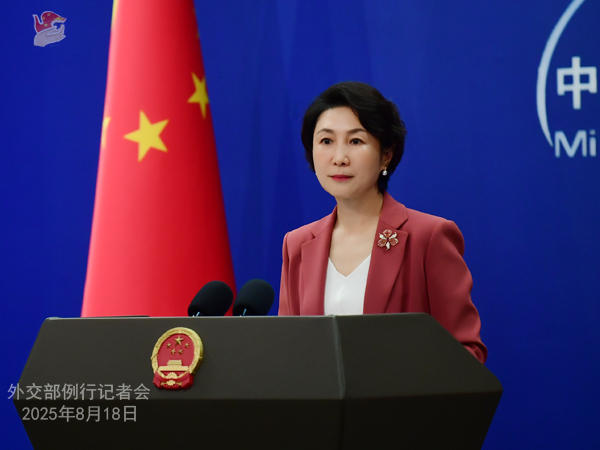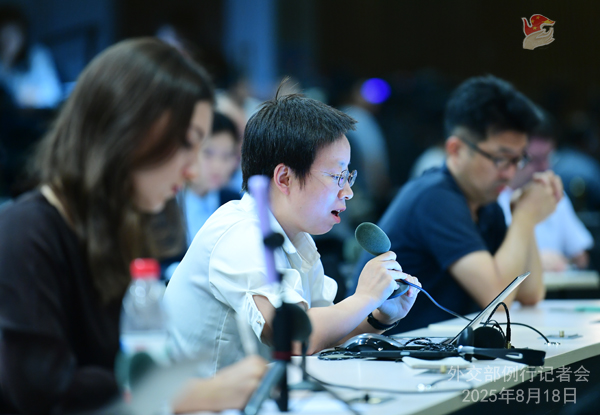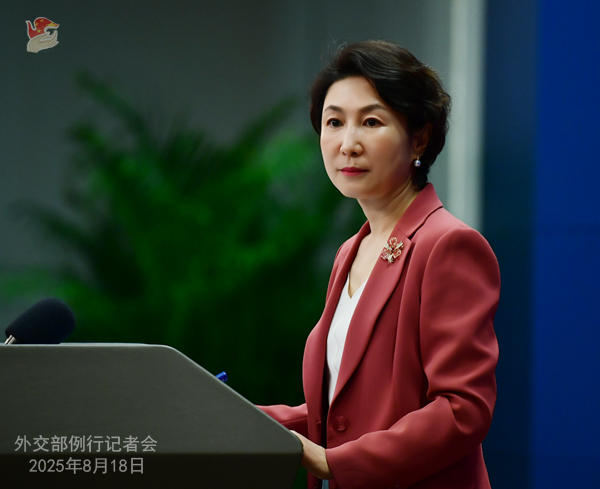
People’s Republic of China


CCTV: China announced that Foreign Minister Wang Yi will visit India and hold the 24th Round of Talks Between the Special Representatives of China and India on the Boundary Question. What is China’s expectations for the visit?
Mao Ning: In October 2024, President Xi Jinping and Prime Minister Narendra Modi had a successful meeting in Kazan, charting the course for improving and growing the China-India ties. Through Foreign Minister Wang Yi’s visit, China hopes to work with India to deliver on the important common understandings between the leaders of the two countries, keep the momentum of high-level exchanges, enhance political mutual trust, strengthen practical cooperation, properly handle differences, and promote the sustained, sound and steady development of China-India relations.
The Talks Between the Special Representatives of China and India on the Boundary Question is a high-level channel for the two countries’ boundary negotiations. In December last year, the 23rd round of talks was successfully held in Beijing, and the two sides reached several common understandings on delimitation negotiations, border management, mechanism building, and cross-border exchanges and cooperation. Since the beginning of this year, the two sides have maintained communication through the diplomatic channels and actively advanced the implementation of those outcomes. For the upcoming round of talks, China stands ready to continue the in-depth communication with India on the above-mentioned issues on the basis of the existing common understandings and with a positive and constructive attitude, and together maintain sustained peace and tranquility in the border areas.
While in India, Foreign Minister Wang Yi will also have in-depth exchange of views with Indian Minister of External Affairs S. Jaishankar on bilateral ties and issues of mutual interest.
RT TV: On August 15 local time, Russian President Putin and U.S. President Trump had their first meeting in six years. It was also the first time President Putin had set foot in the U.S. in a decade. What’s China’s comment?
Mao Ning: China supports all efforts conducive to a peaceful way out of the Ukraine crisis. It’s good to see Russia and the U.S. engage each other, improve ties and promote the process for a political settlement of the crisis.
Reuters: Are there any Chinese citizens who were among the hundreds who died or were missing in the deadly Pakistan floods since late last weekend?
Mao Ning: China takes note of the heavy rainfall that has hit multiple regions in Pakistan and caused fatalities and economic loss. We deeply mourn for the lives lost and extend heartfelt sympathies to those who have lost their loved ones and those who are injured.
Foreign Minister Wang Yi expressed condolences to the Pakistani Deputy Prime Minister and Foreign Minister. We believe the people of Pakistan will overcome the disaster and build back from it at an early date.
At the moment, no Chinese casualties have so far been reported in the disaster. The embassy is still gathering information.
Brasil de Fato: The U.S. government imposed some sanctions on several Brazilian government officials and former Pan American Health Organization representatives involved in a program of Brazil called Mais Médicos (“More Doctors”), which was designed to address a critical physician shortage by deploying healthcare professionals to underserved rural and remote areas in Brazil. I wanted to know what is China’s position on such actions from the U.S. government?
Mao Ning: I’m not aware of the specifics you mentioned. Let me say more broadly that China always opposes unilateral illicit sanctions.

Global Times: The head of the foreign affairs office of the Taiwan region has recently said that after World War II, the Treaty of San Francisco took the place of political statements, such as the Cairo Declaration and the Potsdam Proclamation. The Treaty did not hand over Taiwan to the PRC, and the PRC has never ruled Taiwan. What’s China’s comment?
Mao Ning: Those fact-distorting and misleading rhetorics once again lay bare the nefarious separatist nature of the Lai Ching-te authorities.
Taiwan’s restoration to China is an outcome of the WWII victory and part and parcel of the postwar international order. A series of instruments with legal effect under international law, namely the Cairo Declaration, the Potsdam Proclamation, and the Japanese Instrument of Surrender and so on, all affirm China’s sovereignty over Taiwan. Taiwan belongs to China. This is a solid fact rooted in history and the law and beyond any doubt.
On October 1, 1949, the People’s Republic of China (PRC) was founded, and the Central People’s Government became the sole legal government representing the whole of China. The change of government took place while China remained unchanged as a subject of international law. China’s sovereignty and inherent territory did not change. As a natural result, the government of the PRC fully enjoys and exercises China’s sovereignty, including sovereignty over Taiwan. The so-called Treaty of San Francisco is an illegal and invalid instrument issued by some countries gathered by the U.S. years after the end of WWII to separately make peace with Japan without including the People’s Republic of China and despite the Soviet Union’s rejection. This document contravenes the provisions of the Declaration by United Nations signed by 26 countries—including China, the United States, the United Kingdom, and the Soviet Union—in 1942, and goes against the fundamental principles of the UN Charter and international law. Anything set out in the document, including the sovereignty over Taiwan or the handling of the territory and sovereign rights of China as a non-signatory, is thus entirely illegal and null and void.
The Lai Ching-te authorities have completely forfeited the national stance, disregarded the outcomes of the victory of the Chinese People’s War of Resistance Against Japanese Aggression, and deliberately distorted the history of WWII. This is simply contemptible. Let me stress that no matter what the Lai Ching-te authorities say or do, they do not change the fact that Taiwan is part of China—a fact well supported by history and the law, nor can they change the prevailing international commitment to the one-China principle, still less will they stop the course towards China’s reunification.
AFP: Germany’s foreign minister on Monday said during a visit to Japan that China threatens openly to unilaterally change the status quo and shift borders in its favor, citing China’s behavior in the Taiwan Strait, the East South China Sea and the South China Sea. Does the Foreign Ministry have a comment on this?
Mao Ning: The Taiwan question is China’s internal affair. The one-China principle is the political foundation for the establishment and development of diplomatic relations between China and all countries in the world. It is also a basic norm in international relations and a prevailing consensus in the international community. To keep the Taiwan Strait peaceful and stable, it is absolutely essential to unequivocally uphold the one-China principle and oppose “Taiwan independence” separatist activities. The current situation in the East China Sea and the South China Sea is overall stable. We urge relevant parties to respect regional countries’ joint effort to settle the issues through dialogue and consultation and safeguard peace and stability, rather than sowing discord and hyping up tensions.
Reuters: Ted Hui from Hong Kong has been granted asylum in Australia. How will Canberra’s granting of asylum to a former Hong Kong activist on the run affect China’s ties with Australia?
Mao Ning: The person you mentioned is an anti-China rioter and has been issued an arrest warrant by the Hong Kong police in accordance with the law. The Hong Kong SAR government has issued a statement strongly opposing “harboring of criminals in any form by any country.” We urge relevant countries to respect China’s sovereignty and the rule of law in Hong Kong, stop interfering in Hong Kong affairs, which are also China’s internal affairs, in any form.
On China-Australia relations, China’s position is consistent. We hope Australia will work with China to follow the important common understandings reached between leaders of our two countries, uphold the principle of equality, seeking common ground while shelving differences, and mutually beneficial cooperation, and promote the sound and steady development of China-Australia ties.
PTI: Further to what you announced here about Foreign Minister Wang Yi’s visit to India. Perhaps this is the 24th round of border talks that the two countries are going to have. Probably you can outline how China views the progress of the talks and the prospects of a border settlement in the coming talks because we have already had 24 rounds of talks.
Mao Ning: The Talks Between the Special Representatives of China and India on the Boundary Question has played a positive and constructive role for the two countries’ boundary negotiations. During the 23rd round of talks held last year, the two sides reached several important common understandings that are being earnestly implemented by the two sides. On the upcoming talks, we look forward to working with India to first and foremost follow through on the existing common understandings, and on that basis continue the in-depth communication with India to jointly keep the border areas peaceful and tranquil.
Bloomberg: Donald Trump said that Chinese leader told him that he would not move on Taiwan as long as the U.S. president remained in office. This is according to an interview he gave to U.S. media. Can the Foreign Ministry comment on these remarks from President Donald Trump, and are they accurate?
Mao Ning: China’s position on the Taiwan question is consistent and clear. Taiwan is an inalienable part of China’s territory. The Taiwan question is purely China’s internal affair. Resolving the question is a matter for the Chinese people, and the Chinese people only. We are willing to strive for the prospect of peaceful reunification with utmost sincerity and effort, but we will never ever allow anyone or any force to split Taiwan from China in any way.




